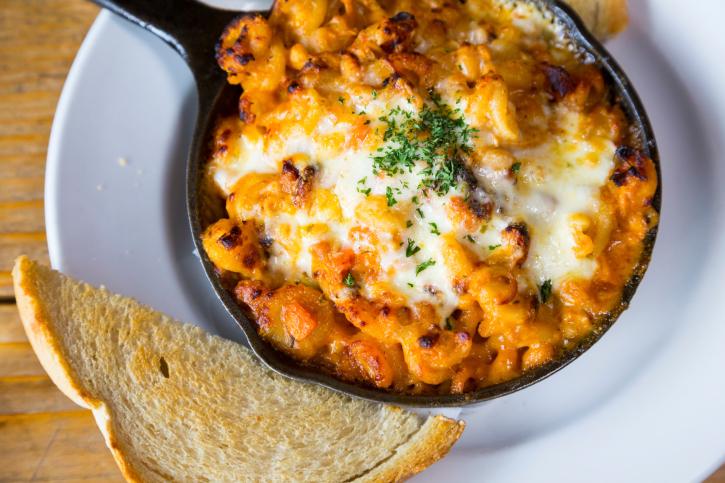
If you need me, I'll be eating this because I'm awesome and I want it. Credit: Thinkstock
Apparently today, December 5, is National Comfort Food Day. Merely typing that sentence released earthquake-like shudders of disgust throughout my body. It seems my opinions have cast me as an outlier in this situation—for, everyone appears to be jumping on this starchy bandwagon—but I assure you, dear foodies, that there is value to abstaining from the notion of "comfort food." While "comfort food" is almost exclusively unhealthy dishes whose consumption does damage in and of itself, it's the reliance on seeking food for comfort that is especially dangerous.
Food Shouldn't "Comfort" You
You know what can comfort you? Cuddling a pet. Spending time with your partner. Music. Your bed. Knowledge. Not food. Don't get me wrong: Food is awesome! As I type this, I am counting down the minutes until I can eat the delicious dish I prepared for myself last night. Enjoying food is great, but the problem arises when we seek food for comfort.
Despite our nation's obsession with churning out overly processed, barely recognizable, food items, the primary purpose of eating is nourishment. It's okay to go cray and enjoy something wildly unhealthy occasionally, but we must recognize the purpose of doing so. If we feel the need to seek comfort, we are likely in a negative space. Enjoying unhealthy foods when we're in this state will not improve our mood.
Traci Mann of the University of Minnesota conducted an experiment to test the effect of "comfort food." Bad moods were induced in participants, and they were fed their chosen "comfort food." Virtually no one reported an elevated mood after dining on their delectable dish. In fact, the results of the control group (who ate nothing) mirrored the participants who ate. Researchers were shocked. I was not (but we'll get there).
Because here's the thing: food can't make us happy. Many form unhealthy relationships with food by thinking that bingeing on, or restricting it, will contribute to their overall happiness. It can't. The amount of chocolate that does (or does not) pass your lips will not silence the demons attacking your psyche. What does happen? Often, folks suffer from guilt after eating not-so-healthy dishes. If said people have established that these items are "comfort food," they will assuage their negative feelings with . . . more "comfort food." And so it continues. For those predisposed to eating disorders, this is an especially dangerous path for your health—both physical and mental.
Now, as a mac & cheese fan myself (I literally ate some last night . . . with truffle oil, OMG), I want to be clear: The occasional indulgence won't create a negative relationship with food—as long as it's informed by a good reason or purpose. Celebrations, for instance, are a great time to enjoy your favorites. You want two slices of birthday cake? Get it girl! Enjoy every bite and focus on how awesome you are while doing so. You know what else works? Saying, "I'm eating this mac & cheese because I like it. I don't need it to 'comfort' me!" Doing this establishes a positive relationship with your meals. Think about it in another way. We toast with champagne in times of happiness—like a wedding. Imagine if you drank champagne for "comfort." The substance is different, but the problem is the same: reliance.
I'm not a doctor, I can't tell you how often to indulge. As a woman who has toured the hell that is an unhealthy relationship with food, let me assure you: defining a positive relationship with it is invaluable. You cannot have a healthy relationship if you seek food for comfort. Food is not your friend; it is your fuel to keep your amazing body going. Treat it as such.






